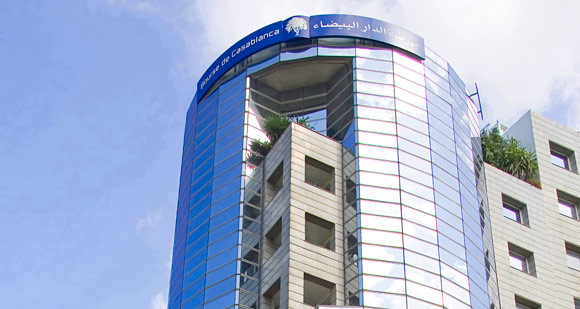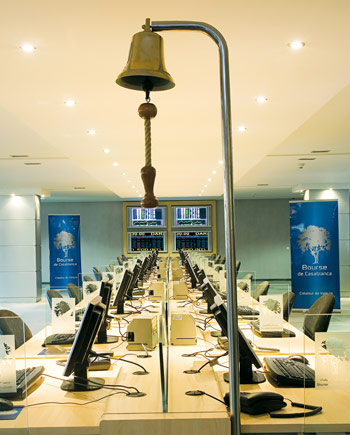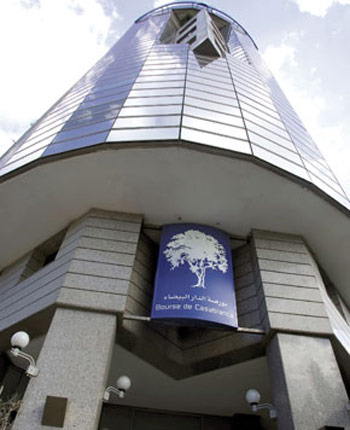African Financial Market in Morocco for Global Investors
Morocco Sector Analysis
African Financial Market in Morocco for Global Investors
For 2011 I think the market will see a 15% rise after a 22% rise in 2010.

Casablanca Stock Exchange
The Casablanca Stock Exchange is one of the oldest bourses on the African continent, having been founded in 1929 under the French Protectorate as “Office de Compensation des Valeurs Mobilières” (Office for Clearing of Transferable Securities). Since then it has gone through major reorganizations and modernizations, notably in 1986, 1993, 1997, and 2000.
Today, it stands out as one of the largest bourse on the African continent. Karim Hajji, CEO of the CSE, offers the following brief introduction to the CSE:
“Morocco is the third largest capital market in Africa after South Africa and Egypt and we have been growing steadily since 1993 when we underwent major reforms driven by the Ministry of Finance for capital markets. This created a new limited company where the shareholders were stockbrokers and also a central depository, and the CDVM as the market authority. In 2001 we multiplied our market capitalization by six with major IPOs with one of the largest telecom company in Africa that accounts for 20% of market capitalization and another with Groupe Addoha – largest real estate developer in Morocco. Morocco has many large companies that are followed by many managers worldwide.”
For 2011 I think the market will see a 15% rise after a 22% rise in 2010.
More formally, the CSE is a joint stock company (“société anonyme”) jointly owned by 17 brokerage firms, whose purpose is to provide a market, under the regulation of the Ministry of Economy and Finance, where transferable securities are publicly traded.
It comprises a central market, where buy and sell orders are matched for each security listed; and a block-trade market where listed securities are traded over-the-counter for a size equal to or greater than the minimum block size under price conditions derived from the central market.
The CSE sees its mission as ensuring the running, growth and promotion of the Moroccan stock market by:
-
Monitoring and managing trading sessions;
-
Publishing and disseminating market information;
-
Providing assistance to issuers in the listing of their securities and in the execution of their financial transactions;
-
Intervening to ensure successful transaction completion between the various parties;
-
Guaranteeing that transactions are cleared in the event of default by some intermediary.
According to Hajji, the CSE faces two major challenges of perception and awareness. The first challenge is internal and domestic: convincing Moroccans to utilize the legal and financial devices that are made available to entrepreneurs and investors by trading on the stock ma rket.
rket.
The second challenge is in attracting international funds and investors into the Moroccan market. In one respect, the problem is simple, says Hajji: “Today, we don’t have enough investors.”
In approaching the first challenge, Hajji and the CSE believe that the market they offering for stock can be a great help to a lot of Moroccan entrepreneurs in achieving the financial support they need to start or grow their enterprises; and further, that the CSE can play a much greater role in Morocco’s plans for economic growth.
But, in order to convince them of the advantages of stock offerings, certain resistances and problems of perception must be overcome. Hajji explains this problem this way:
“Traditionally Morocco has a been a market where banks insure most of the long-term financing for companies so our challenge is to show them how capital markets (like the stock market) can help finance their investment needs. … Some entrepreneurs fear that by being listed they may lose control over their companies and they don’t want to share their figures with competitors. Our goal is to convince them that by entering the market they won’t lose control.”
This has led the CSE to engage in substantial educational efforts to raise local awareness. According to Hajji:
“We feel like we have a social responsibility to raise awareness about financial issues because many Moroccans do not understand the language of money and that this is crucial for success. This spans from educating people on the market, setting family budgets, purchasing a home, or investing in the market- it covers all areas. Only one out of two Moroccans has a bank account and the Central Bank is currently keen on improving access to banking to more people in Morocco. I think this will contribute positively to the financial education of our citizens.”
As a result, the CSE is conducting conferences, workshops, and seminars for business people and students to inform them and raise interest in the market.
One such activity was the announcement of CSE’s partnership with the Hope Foundation and Wikia. This is a course in financial literacy based on a Wikia platform that is intended to be made available in all languages and downloadable from the internet. According to the announcement:
“The Forum of Young Global Leaders is an exceptional community of individuals who share a commitment to shaping the global future. Together, they form a powerful international community focused on having a dramatic impact on global affairs and to make sure that global decision‐making preserves the interests of the next generation. Understanding the language of money is important because it affects every aspect of our lives. Financial literacy is about learning how the system can stabilize families, helping them to make sound financial decisions, empowering them to do more with the money they make.”
CSE’s own Karim Hajji spearheaded the first translations of the HOPE curriculum, translating it into French and Arabic. “Helping all Moroccans take a step towards financial awareness is something I feel passionate about,” said Hajji. “Bringing global entrepreneurs like John Bryant and Jimmy Wales here to the Casablanca Stock Exchange shows our commitment to bring awareness to this important issue.”
By raising financial literacy, Hajji hopes that business people and entrepreneurs will come to realize the usefulness and value of the services offered by the CSE. Presently, says Hajji, “the stock market finances only about 10-15% of companies’ investment needs; our goal is to triple that in the next ten years.”
The Global Forum project is primarily intended as part of the educational efforts to bring financial literacy to individuals in Morocco. But, because it is a global project, Project Hope is also related to the second challenge facing the CSE—which is to attract international investment and participation in the CSE. In this regard, the CSE is taking several initiatives.
The first, and one of the most important, is to make the CSE accessible to the English-speaking world. “The first thing we have done,” says Hajji, “is to publish the companies’ financials in English, so that any investor can access the information in French, English, or Arabic.”
A second initiative is the creation of FTSE CSE Morocco indices. Hajji explains:
“This is a very important step because it is a real partnership and the aim is to give more visibility to the CSE worldwide and to enable fund managers in country and abroad to create ETFs (exchange traded funds) to use as a index benchmark. With the FTSE all share and liquidity 15 index we have two indexes that will be more easily replicated than the current indexes. We think this is a strong step towards achieving more international visibility and to improve liquidity in our markets through ETFs. For the investor they will be able to buy stocks directly on the internet and track the CSE performance. The FTSE performance data goes back to June 2007.”
Another initiative to reach out to both local and international investors is opening the derivatives market on the CSE. According to Hajji:
“We are working closely with the market authorities to put the derivatives market into place and hopefully we should see the first law enacted by April or October 2011. It will take 18-24 months to establish an operating market once the regulations are enacted. Derivatives are speculative but also allow insurance companies and banks to hedge their risk on capital markets. The CDVM is keen on protecting investors and in the first phase they will want to make sure only investors can buy or sell derivatives on the market and they will want to protect the market from too much speculation.”
The outlook for the CSE is good, says Hajji: “For 2011 I think the market will see a 15% rise after a 22% rise in 2010.” Hajji also believes that the CSE may look forward to a significant rise in IPOs: “We also expect to see 6-7 IPOs in 2011, while we only saw 2 in 2010.”